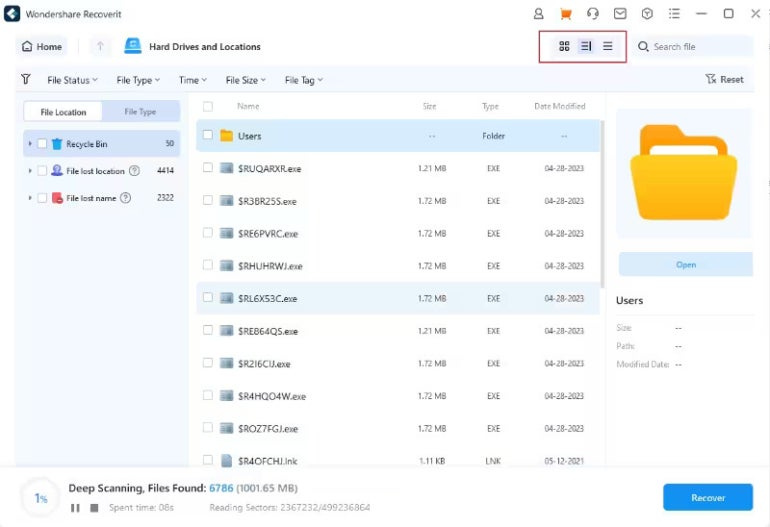- Best for ease of use: Stellar Data Recovery
- Best for advanced features: EaseUS Data Recovery Wizard
- Best for deep scanning: MiniTool Power Data Recovery Software
- Best for extensive file type support: AnyRecover
- Best for affordability: Recuva
- Best for flexibility: OnTrack EasyRecovery
- Best for speed/fast recovery process: Disk Drill
- Best for media files recovery: Wondershare Recoverit
Data recovery is a process involving the retrieval of deleted files from a device’s hard drive. This can entail data that was stored on workstations, laptops, mobile devices, servers, cameras, flash drives — anything that stores data on either stand-alone or mirrored and arrayed drives, whether internal or external.
In some cases, the files may have been accidentally or deliberately removed; in others, the medium or partition it contains is damaged, failing or failed. This guide analyzes the best data recovery software to use if you are unable to recover your files from a backup or recycle bin.
Jump to:
- Top data recovery software: comparison chart
- Frequently asked questions about data recovery software
- Key features of data recovery software
- Benefits of working with data recovery software
- How do I choose the best data recovery software for my business?
- Review methodology
Top data recovery software: comparison chart
| Software | Best for | Supported platforms | Photo and video recovery | Data preview capability | Free plan | Starting price |
|---|---|---|---|---|---|---|
| EaseUS Data Recovery Wizard | Advanced features | Windows, macOS, iOS, Android | Yes | Yes | Yes | $69.95 per month |
| MiniTool Data Recovery Software | Deep scanning | Windows, macOS | Yes | Yes | Yes | $69 per month for one PC |
| AnyRecover | Extensive file type support | Windows, macOS, Android, iOS | Yes | Yes | Yes | $59.99 per month |
| Recuva | Affordability | Windows | Yes | Yes | Yes | $24.95 for one year premium subscription |
| Ontrack EasyRecovery | Flexibility | macOS, Windows, Linux | Yes | Yes | Yes | $59.99 per year |
| Disk Drill | Fast recovery process | Windows, macOS | Yes | Yes | Yes | $95.68 for 1 user and up to 3 simultaneous activations |
| Wondershare Recoverit | Media files recovery | Windows, macOS | Yes | Yes | Yes | $79.99 per year |
Stellar Data Recovery: Best for ease of use

Stellar is probably one of the most popular options in our list, with a wide array of file recovery capabilities. There’s a free version with basic functionality and an array of paid versions that can recover files from formatted or encrypted drives and restore deleted emails, an ability that’s valuable and unique (Figure A). In addition, it can recover partitions, access unbootable or RAW drives, create disk images, recover data from CDs and DVDs, and repair photos and videos.
Figure A
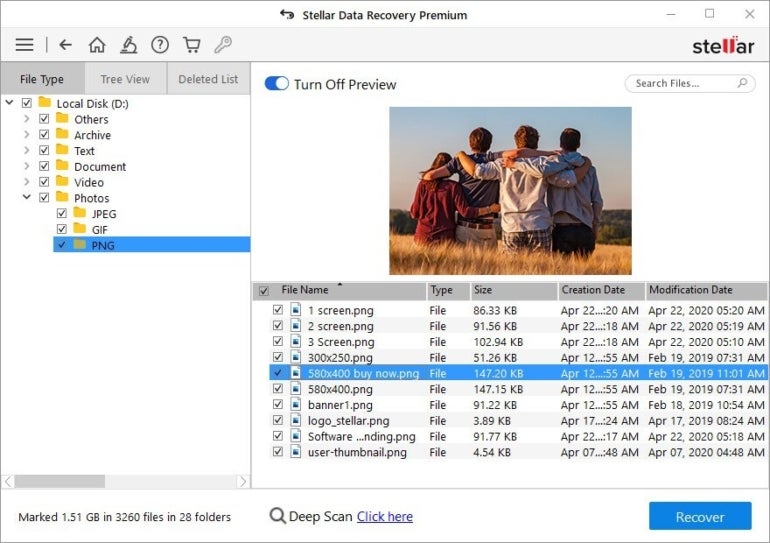
Pricing
The Stellar Data Recovery tool can be downloaded for free. Business users looking for advanced features can buy a one-year or lifetime license:
- Standard: $69.99 for a one-year license or $129 for a lifetime license; although, Stellar is offering a sale right now for Windows devices at $59.99 for the one-year license and $99 for the lifetime license. License usage is for individuals.
- Professional: $99.99 for a one-year license or $199 for a lifetime license; although, Stellar is offering a sale right now for $89.99 for the one-year license and $149 for the lifetime license. License usage is for individuals.
- Premium: $209.99 for a one-year license or $319 for a lifetime license; although, Stellar is offering a sale right now for $99.99 for the one-year license and $199 for the lifetime license. License usage is for individuals.
Features
- Recovers deleted files from an encrypted hard drive.
- Recovers files from bootcamp partitions.
- Repairs video and photo files.
- Supports different file formats, including exFAT, NTFS and FAT-formatted drives.
Pros
- Free plan available.
- Repairs corrupt JPEG, ARW, CR2, CR3, CRW, DNG, ERF, HEIC, MRW, NEF, NRW, ORF, PEF, RAF, RW2, SR2, SRF and TIFF file types.
- Intuitive and easy-to-use interface.
- Easy to set up.
Cons
- Deep scans can take a lot of time to complete.
- The professional plan lacks video and photo repair capabilities.
EaseUS Data Recovery Wizard: Best for advanced features
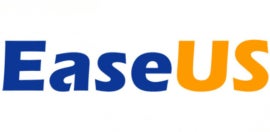
EaseUS can be considered another corporate data recovery tool. Its offerings include “Todo Backup,” which can back up data for enterprises, thereby reducing the need for file recovery strategies. Recovery Wizard allows users to scan and recover files, and users can save scan results to restore files later without having to undergo a brand new scan (Figure B).
Figure B
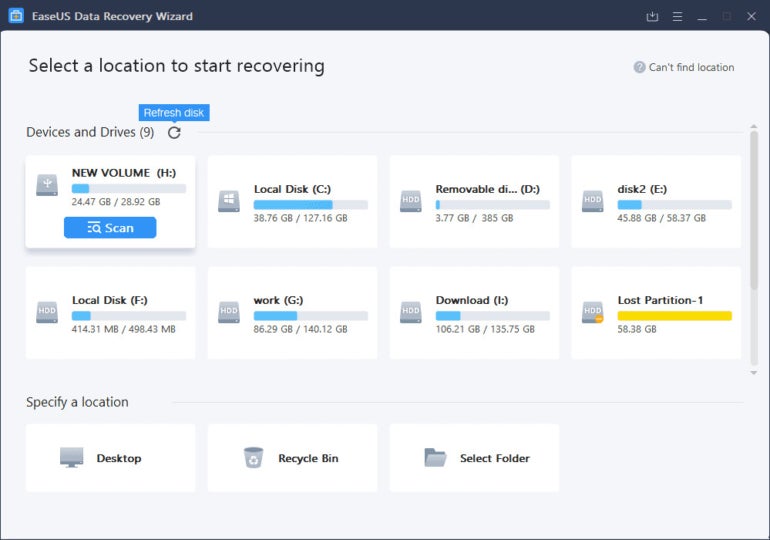
A nice additional feature includes the ability to recover data from RAW file systems, when the partition table is damaged or the master boot record corrupted such that the operating system itself cannot access any data on it.
Pricing
EaseUS offers a free plan that can recover up to 2GB worth of data, but it lacks advanced recovery features. Its paid plans, Individual and Bundles, have subplans to choose from:
- Data Recovery Wizard Professional: $69.95 per month, $99.95 per year, or $149.95 for a lifetime license for individual users.
- Data Recovery Wizard Technician: $299 per year, or $499 for a lifetime license for businesses.
Features
- Crashed PC recovery with a bootable USB in WinPE.
- BitLocker data recovery.
- NAS data recovery.
- Corrupted video repair and advanced photo repair capabilities.
- File previews before recovery.
Pros
- EaseUS Data Recovery Wizard has the ability to repair Office documents.
- It’s easy to use, even for nontechnical individuals.
- Users applaud its recovery rates.
- EaseUS Data Recovery Wizard has reportedly good recovery results.
Cons
- The recovery time is slow.
- Some users say the tool is pricey.
MiniTool Power Data Recovery Software: Best for deep scanning

MiniTool Power Data Recovery Software is a data recovery tool designed to help users recover lost or deleted files from various data storage devices, such as hard drives, SSDs, USB drives and memory cards. It can help users recover file loss under various data loss circumstances, including file deletion, virus invasion, disk failure and file system error (Figure C).
Figure C
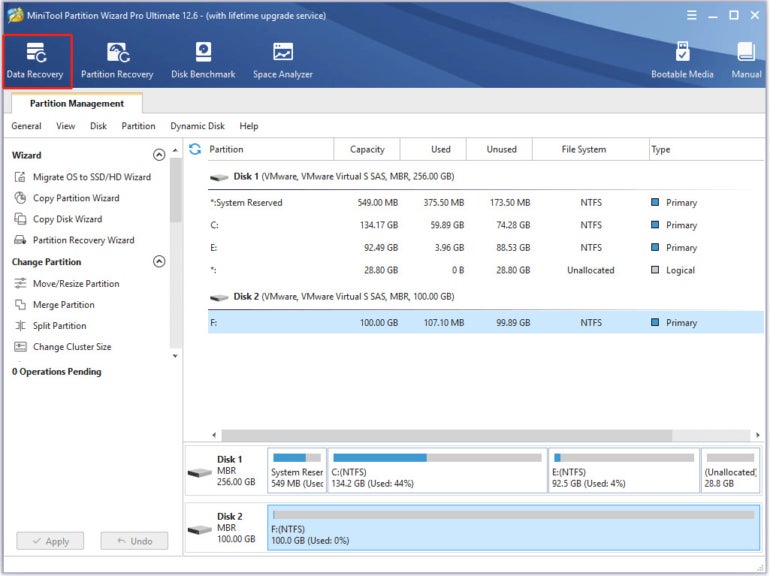
Pricing
MiniTool Power Data Recovery Software pricing for Windows and Mac devices is different. This may be due to the fact that its Mac recovery solution is developed in partnership with Stellar Data Recovery.
MiniTool Power Data Recovery Software personal license for Windows:
- Free: Available at no cost for up to 1GB data recovery limit.
- Personal (monthly subscription): $69 per month for one PC.
- Personal (annual subscription): $89 per month for one PC.
- Personal Ultimate (perpetual license): $99 for lifetime access for up to three PCs.
MiniTool Power Data Recovery Software business license for Windows:
- Business Standard: $119 for one license for one PC/Server.
- Business Deluxe: $199 for one license for one PC/Server.
- Business Enterprise: $399 for one license for 99 PCs/Server.
- Business Technician: $499 for one license for 299 PCs/Server.
MiniTool Power Data Recovery Software for Mac:
- Standard: $69.99 for one year for one Mac or $129 for lifetime access.
- Professional: $89.99 for one year for one Mac or $149 for lifetime access.
- Premium: $99.99 for one year for one Mac or $199 for lifetime access.
- Technician: $149 for one year license for three Macs.
Features
- Supports various file types, including photos, videos, audio and documents.
- Supports APFS, HFS+, FAT and NTFS drives on macOS Ventura 13 and lower versions.
- Recovers files stored on HDD, SSD, USB drive and SD card.
Pros
- Allows users to load previous scan results with paid plans.
- Offers the ability to recover files, images, videos, audio and emails emptied from Trash.
- Offers a deep scanning capability.
Cons
- The free plan is limited to up to 1GB of data recovery.
- The user interface can be improved.
- Scanning processes are slow.
AnyRecover: Best for extensive file type support

AnyRecover is a data recovery program that helps users recover deleted or lost data from various storage devices, such as hard drives, SSDs, USB drives, memory cards and more. The platform supports the recovery of various file types, including documents, photos, videos, audio files and emails. It can also recover data lost due to deletion, formatting, system crash and other data loss scenarios (Figure D).
Figure D
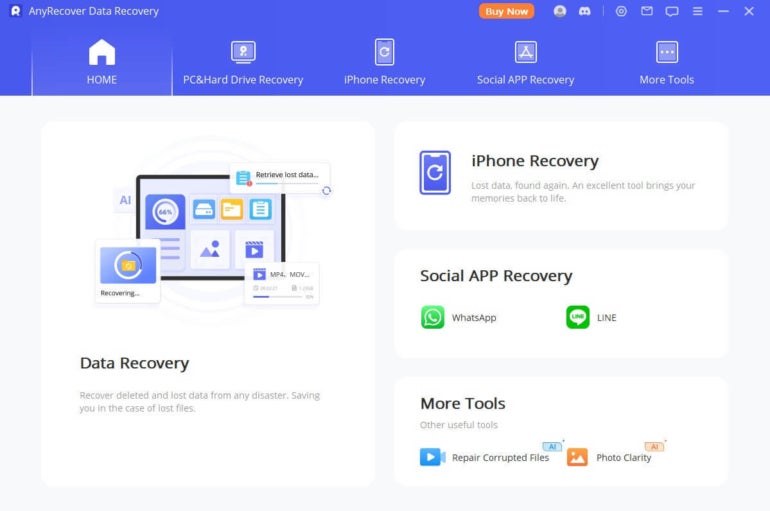
Pricing
This vendor offers both individual and business plans.
Individuals:
- 1 Month: $1.99 per day or $59.99 per month for three devices and two PCs.
- Perpetual Plan: $0.01 per day or $99.99 for a lifetime usage for five devices and three PCs.
- 1 Year: $0.22 per day or $79.99 for one year for three devices and two PCs.
Business:
The cost depends on the number of devices.
- 3 PCs and 10 devices: $139.99 per year, billed annually.
- 10 PCs and 20 devices: $259.99 per year, billed annually.
- 10 PCs and unlimited devices: $379.99 per year, billed annually.
- Unlimited PCs and 20 devices: $459.00 per year, billed annually.
- Unlimited PCs and unlimited devices: $499.99 per year, billed annually.
Features
- WhatsApp and LINE recovery capability.
- Unsaved documents for Microsoft, Excel and PDF restoration.
- Files from crashed systems and formatted devices restoration.
- AI-based photo and video restoration.
Pros
- 24/7 technical support.
- Data preview capability.
- Compatible with both unrooted and rooted Android devices running Android 0S 2.0 to 14.0.
- Wide device and storage support.
Cons
- Limited free version.
- Support can be improved.
Recuva: Best for affordability
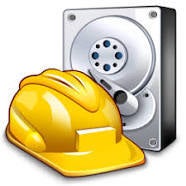
Recuva is a good, basic data recovery software program that is easy to use and can quickly tell users what their chances are of retrieving their file or set of files (Figure E). It works with just about any type of storage medium, including damaged CDs or DVDs, assuming these are in decent enough shape to pull files from. Recuva can perform quick scans or deep scans, the latter being more time consuming but also yielding a better shot at data recovery.
Figure E
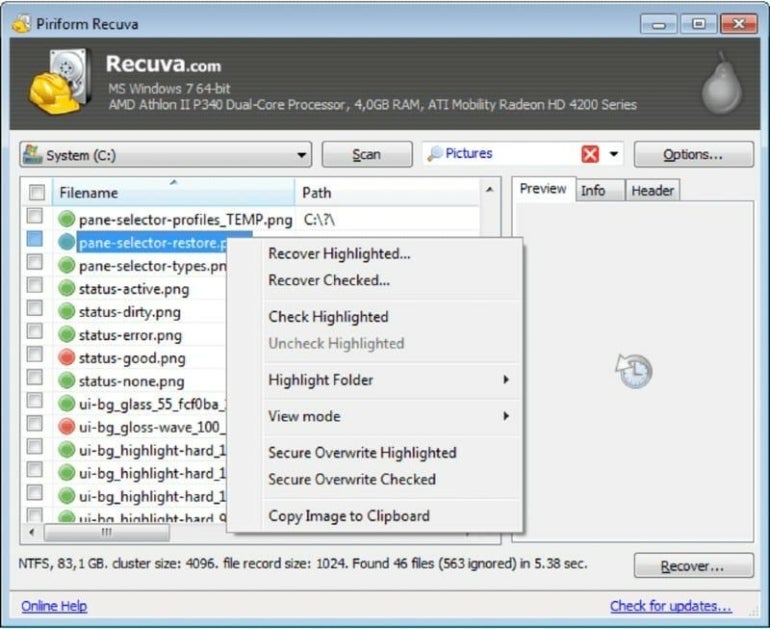
Pricing
Recuva offers a free version at no cost and a professional version for a one-time charge of $24.95. Users who want more advanced data recovery may want to take advantage of one of the CCleaner subscriptions that can be bundled with Recuva:
- CCleaner Professional Plus: $49.95 for a one-year license covering up to three devices; although, it is on sale right now for $34.95.
- CCleaner Premium: $79.95 for a one-year license covering up to five devices or $159.95 for a two-year license covering up to five devices; although, both plans are on sale right now for $51.95 and $89.95, respectively.
Features
- Ability to recover data from damaged disks.
- Can recover pictures, music, documents, videos and emails.
- Supports virtual hard drives.
Pros
- Recuva offers affordable pricing.
- Although it can be a bit slow during deep scans, users reported that it’s generally fast.
Cons
- User interface can be improved.
- It’s limited to Windows.
OnTrack EasyRecovery: Best for flexibility

OnTrack is the first product in our roundup I would consider wholly business-based due to the efficacy and breadth of the software. There’s a free version with basic functionality and an array of paid versions that can recover files and create disk images and data from CDs and DVDs; monitor hard drive health; repair photos and videos and clone drives; work with RAID arrays; and recover entire volumes, whether corrupt, damaged or deleted (Figure F).
Figure F
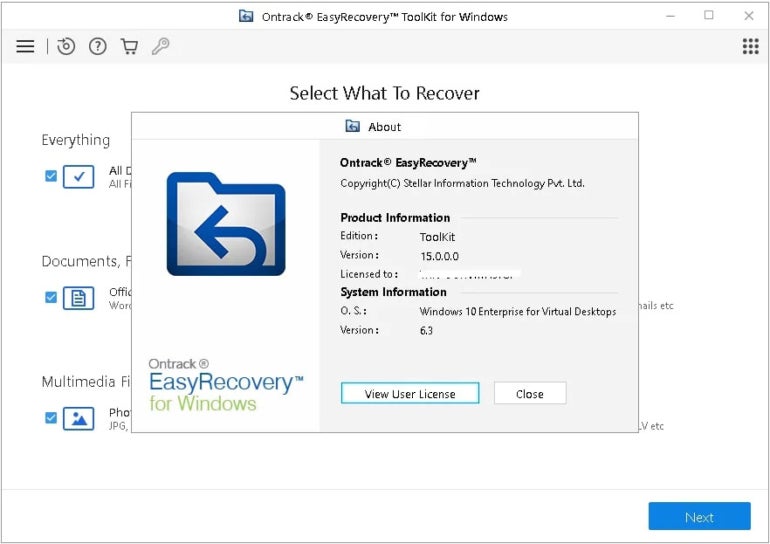
Pricing
OnTrack EasyRecovery is available in free and paid versions.
- Ontrack EasyRecovery Home: $59.99 per year for Windows devices, and $69.99 per year for macOS devices.
- OnTrack EasyRecovery Professional: $99.99 per year for Windows and macOS devices.
- Ontrack EasyRecovery Premium: $109.99 per year for one Windows or macOS device.
- Ontrack EasyRecovery Technician: $199.99 per year for use on up to three Windows or macOS devices.
- Ontrack EasyRecovery Toolkit: $299.99 per year for use on up to three Windows or macOS devices.
Features
- Recovers data from CDs and DVDs.
- Supports Windows, Mac and Linux.
- Recovers lost or formatted RAID 0, 5 and 6 volumes.
- Recovers data from SSD and conventional hard drives, USB flash drives and optical media.
Pros
- It can perform both quick scans and deep scans.
- The professional plan users can create disk images.
Cons
- Free plan can recover only a maximum of 1GB of data.
- Higher tier plans are expensive.
Disk Drill: Best for speed/fast recovery process

Disk Drill carries the standard array of versatile file recovery features, including restoring data from corrupted and compressed volumes, and adds a few new and unique concepts.
The product offers a Recovery Vault that is an index referencing all deleted files, which can help attempt to undelete them (Figure G). It also uses a Guaranteed Recovery mechanism (Apple only) that is a “recycle bin for the recycle bin,” meaning it can retrieve files emptied from the initial recycle bin location. In addition, Disk Drill lets users create .ISO, .IMG or .DMG image files of recoverable data that create a copy they can work with to restore information.
Figure G
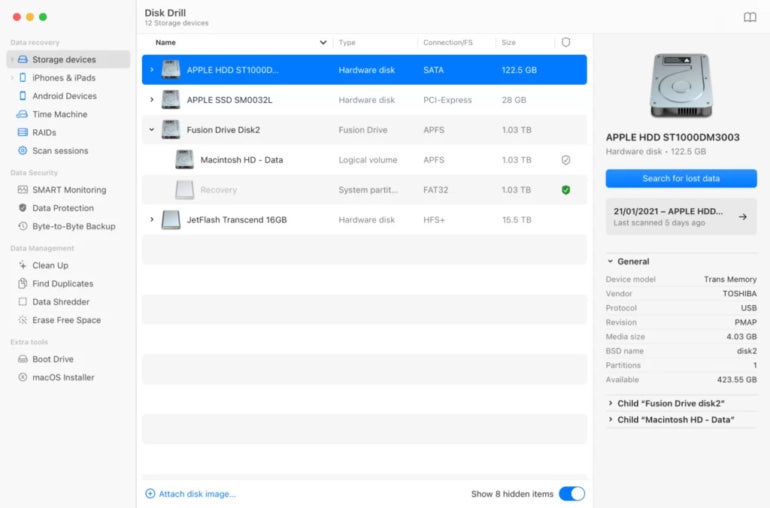
Pricing
- Basic: Free for up to 500MB data recovery.
- Pro: $89 or $118 for a lifetime upgrade for one user and up to three simultaneous activations.
- Enterprise: $499 or $598 for a lifetime upgrade.
Features
- Multidevice support, including HDD, SSD, USB drive, digital camera, SD, CF card, PC, Mac, iPhone and Android.
- Recovers various file types such as video, audio, images, documents, archives and more.
- Recovery for various data loss scenarios, including lost partition, RAW file system, virus infections, empty recycle bin, formatted external drive, crashed hard disk and more.
Pros
- It supports multiple file systems FAT16/FAT32/exFAT, NTFS, NTFS5, HFS, HFS+, APFS, EXT2/EXT3/EXT4 and RAW disks.
- Users applaud its recovery capability.
- Users also applaud it for its fast speed.
Cons
- Free data recovery is limited to 500MB.
- Lacks phone support.
Frequently asked questions about data recovery software
What is data recovery software?
Data recovery software analyzes a hard drive, whether fully operational or in a deprecated state, to determine what data it can salvage and then do so if the information remains intact. The software must be able to access the drive in order to perform, and the drive must be at least semi-functional.
SEE: Stay prepared with this resource and data recovery policy from TechRepublic Premium.
How does data recovery software work?
When a file is deleted under normal conditions, as opposed to intentionally wiped or otherwise securely deleted using tools or special software, the operating system doesn’t actually delete it. Rather, it removes the file’s icon or appearance in a directory display listing and marks the space on the drive as reusable. That data effectively becomes a tenant in a residence that can be evicted without warning at any moment.
Data recovery software uses various techniques, such as scanning, file signature matching, reassembly and extraction, to analyze the data structures on the device and retrieve lost data. In some cases, data recovery may be impossible if the files have been overwritten or the storage device has suffered physical damage.
How safe is data recovery software?
Data recovery software is generally safe to use as long as users download or buy from verified and well-known software vendors, as reputable providers invest in security measures and regularly update their software to protect against cyber threats.
Key features of data recovery software
While data recovery software offers many helpful features, below are the key capabilities to look for when shopping for the best data recovery tool for you or your business. It’s also important to follow best practices when recovering data from company-owned or company-purchased resources.
Multiple file type support
Important data can come in many forms — it could be a video, image, document or audio file. Choose an all-in-one tool that offers the capability to help you recover data regardless of file type. The best tool can recover various document types such as docx, doc, rtf, xls, and more; photo files such as jpg, png, bmp, gif, svg and more; video files such as mov, mp4, 3gpp, amv and more; audio files such as aac, aa3, mp3, wav and more; email and achieve files such as emlx, ost, cab, jar and more.
Having multiple file type support in a data recovery tool gives you the flexibility to recover data from different sources and ensures that no matter what type of file you’ve lost, you have a high chance of recovering it.
Preview capability
The preview function enables you to view the recoverable files before commencing the recovery process. This feature allows you to verify each data restoration and ensures the right files are restored. Preview functionality is especially helpful if you have limited storage and want to avoid data duplication — individuals with files with similar names, sizes or attributes will find this feature beneficial.
Multidevice support
Employees often use different devices to access and store data. These include USB flash drives, SD memory cards, SDD, HDD, NAS devices and other storage media. It’s essential to opt for data recovery software that offers the capability to restore data from all types of storage devices.
Different scanning modes
The best data recovery tools feature quick scans, which allow you to scan and recover recently deleted or lost files easily without impacting the state of the storage device. Alternatively, if the quick scan option is unable to recover your files as a result of a system crash, formatted disks, or corrupted file system, a deep scan can thoroughly scan your drive folder, subfolder and directory to find lost or damaged files. Deep scans increase your chance of data recovery success.
Multiplatform support
Not all data recovery software support all operating systems. Buying a tool that’s compatible with different operating systems is a huge plus, as it gives you the flexibility to recover data from various devices running on different operating systems such as Windows, Mac, Linux, Android and iOS. Keep in mind that not all systems support all file types. Hence, the need to check your chosen tool’s compatibility — ensure it supports file systems such as NTFS, FAT, exFAT, HFS, HFS+, APFS and ReFS, among others.
Benefits of working with data recovery software
- Time saving: Instead of consulting an expert — which is usually expensive, you can use a data recovery tool to attempt to recover your lost data for free or for a small fee.
- Comprehensive recovery: This software can help you recover various file types, including documents, photos, videos, audio files, emails and more.
- Recover lost or deleted files: These tools can help you recover data lost in different data loss scenarios such as viruses or crashes.
- Compatibility: It works with hard drives, solid-state drives, USB drives, memory cards and more.
- Flexibility: The tool allows you to recover data on your own terms.
How do I choose the best data recovery software for my business?
Keep in mind that the best data recovery software for you depends on your unique needs. Here are some pointers to remember when shopping for a data recovery tool:
- Compatibility with your file, device and operating system.
- Verify its recovery capabilities and success rate.
- Ease of use of the tool.
- Quality of service offered by the vendor.
All in all, the eight products listed here are well-suited to help rescue precious data. The availability of portable, free versions that can easily help users evaluate the products and a plain and simple cost structure to set cost expectations are both welcome elements.
Review methodology
We analyzed the best data recovery tool by conducting extensive research about the top tools in the market. We tested the tools to learn about their recovery capabilities and other features and functionalities. We also gathered usability data from user feedback on review sites to learn about current and past customers’ experiences.



